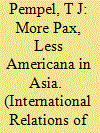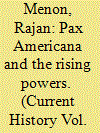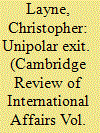| Srl | Item |
| 1 |
ID:
099073


|
|
|
|
|
| Publication |
2010.
|
| Summary/Abstract |
Northeast Asia presents a major theoretical puzzle: the region is rife with security challenges and seems continually poised for horrific military conflicts. Yet, despite many structural tensions, the region has been devoid of significant shooting wars since the signing of the Korean armistice in 1953. This essay examines two major contributions to that pacific condition: first, the pervasive focus on economic development and the growing economic links across the region; and second, the growing number of multilateral institutions within the Asia-Pacific. It concludes that while a 'Pax Americana' was important to peace in the past, the long-term prospects are for the continued absence of overt conflict but in ways that will reflect an overall decline in America's capacity to shape regional developments.
|
|
|
|
|
|
|
|
|
|
|
|
|
|
|
|
| 2 |
ID:
091450


|
|
|
|
|
| Publication |
2009.
|
| Summary/Abstract |
Much of what purports to be new American thinking on international politics amounts to a bland repackaging of old shibboleths. Almost everyone, even including those who predict the rise of the rest, assumes the United States will remain, in the words of former Secretary of State Madeleine Albright, the indispensable nation.
|
|
|
|
|
|
|
|
|
|
|
|
|
|
|
|
| 3 |
ID:
106955


|
|
|
|
|
| Publication |
2011.
|
| Summary/Abstract |
In this article I show that the unipolar era already is drawing to a close. Three main drivers explain the impending end of the Pax Americana. First, the rise of new great powers-especially China-is transforming the international system from unipolarity to multipolarity. Second, the United States is becoming the poster child for strategic over-extension, or as Paul Kennedy dubbed it, imperial overstretch. Third, the United States' relative economic power is declining, and mounting US fiscal problems and the dollar's increasingly problematic role as the international financial system's reserve currency are undermining US hegemony. After examining how these trends undermine the argument for 'unipolar stability', I conclude by arguing that over the next two decades the Pax Americana's end presages dramatic changes in international politics.
|
|
|
|
|
|
|
|
|
|
|
|
|
|
|
|